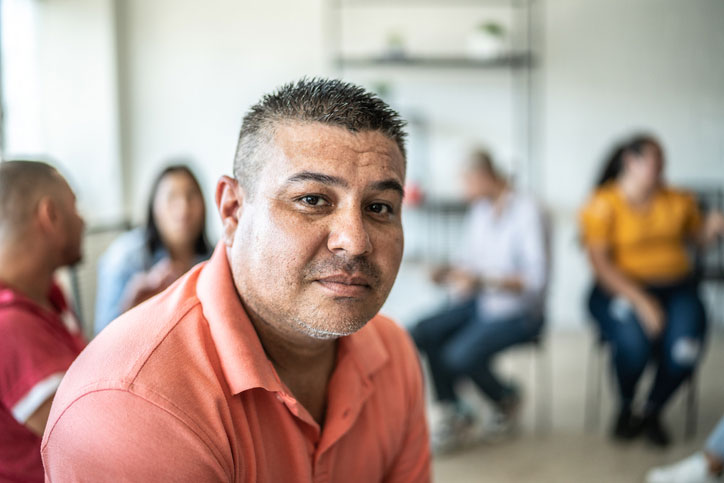Written by Scott Wilson

There are some areas in which social work has more reach into the lives of average Americans than others. Care and support for mental health issues is one of those.
According to the New York City Department of Health and Mental Hygiene, as of 2021, 20% of children below the age of 13 exhibited symptoms of poor mental health. A full 36% of teenagers described feeling hopeless and sad enough that it prevented them from doing daily activities. The BIPOC and LGBTQIAS2+ communities were disproportionately affected. A full 4% of the adult population in New York City has been diagnosed with a serious mental health illness, including everything from schizophrenia to serious depression. This is to say nothing of those who haven’t been diagnosed and the millions more dealing with less severe issues ranging from anxiety and social problems to nonclinical depression.
The role of social work in mental health treatment and prevention is significant. For folks living on the margins of society in New York City and around the state, contact with a social worker may be the first chance they have to even get a diagnosis. Social workers are an important part of the process of referring those patients to other treatment services, or delivering therapy directly.
Even more critical can be the advocacy that social workers perform on behalf of the American mental welfare system in general. While they have the capability to help individuals pick up the pieces and recover from mental and behavioral issues directly, social workers are also on the front lines of getting more funding and more resources to prevent and treat such issues systemically.
What Does a Mental Health Social Worker Do in New York?
This specialized role, more than any other in social work, is the province of licensed clinical experts. In New York, that makes your destination the highest level of licensing available in the state: Licensed Clinical Social Worker.
Like other areas that social workers cover, their approach to mental health treatment is grounded in social and cultural understanding. While licensed clinical social workers (LCSWs) are trained and authorized to provide the same kind of psychotherapy treatment as mental health counselors and psychologists, they also look toward environmental factors in mental health and how to address them.
Social workers in mental health rarely have the luxury of dealing exclusively with psychological therapy.
There is big-time crossover between major American societal challenges and incidences of mental and behavioral health disorders. Drug use, homelessness, and chronic healthcare issues are common co-occurring issues with patients. Populations experiencing those issues are also those which typically have the least access to conventional mental healthcare through formal psych or counseling services.
That leaves social workers to pick up the slack. Fortunately, they are also well-trained in dealing with the many kinds of mutually reinforcing issues these populations experience.
That comes with the training they receive in both individual psychotherapy and in addressing systemic problems in their communities.
A social worker is embedded in a neighborhood in ways that a regular therapist never would be. So they can account for the dynamics of social relationships, the availability of care, the systems of support, and other factors that are all important in delivering effective mental health care.
Mental Health Treatment in Social Work Branches Out Into Many Specialized Disciplines

Different populations have different kinds of threats to their mental health from different sources and with different treatments. So it’s common for mental health social workers to further specialize in dealing with certain kinds of patients.
The role of a social worker in child mental health, for instance, may revolve around addressing bullying and feelings of alienation. The Substance SAMHSA reported that more than three million teenagers had serious thoughts of suicide in 2022, a trend that dramatically rose during the COVID-19 pandemic. A strong understanding of culture and the role of society in the human development process makes social workers uniquely suited to reversing those numbers.
On the other hand, the role of a social worker in community mental health may lean more toward triage and facilitating group therapy. Up-state, near Fort Drum, they may find themselves dealing primarily with PTSD or other treatments for trauma. Closer to the city, the work may lean more toward handling issues stemming from or co-occuring with homelessness or substance use disorders.
There are limited opportunities in the field to practice at the intermediate level, handling case management and making referrals. Those positions don’t necessarily require licensure, but still need a strong social work education.
At the big-picture end of the spectrum, even more education and polish is needed to lobby for substantive change in a rickety system of mental health supports. But social workers engaged through efforts like the Mental Health Project of the Urban Justice Center work toward influencing legislation and public opinion through outreach, coalition-building, and direct advocacy efforts.
Specialized MSW Degrees To Prepare You for a Role in Mental Health Social Work
There’s only one kind of degree that qualifies you for an LCSW in New York, and that is a Master of Social Work. And you won’t be performing any mental health evaluations or interventions in New York without earning the LCSW first.
Not just any old MSW will do; the New York State Education Department (NYSED) standards call for a CSWE-accredited degree that includes at least 12 credits of clinical instruction.
The good news is that most of the MSW programs in the state meet that standard. It’s also possible to follow up later with a Certificate of Social Work that fills in those missing clinical credits.
Mental health counseling is one of the major degree tracks you will find for specialization in MSW programs across New York State. You’ll find them with titles like:
- Master of Social Work specialization in Mental Health, Substance Abuse and Trauma in Context
- Master of Social Work in Health, Mental Health, and Disabilities
- Master of Social Work in Military Culture & Mental Health Practice Specialization
- Master of Social Work in Mental Illness
Of course, any Master of Social Work in Advanced Clinical Practice will also deliver the skillset needed to work closely with patients with mental health disorders. Because many of these disorders, by their nature, either cause or emerge in times of crisis, a Master of Social Work in Crisis and Resilience is also a way to further specialize your mental health practice. And you will find some programs that offer concentrations in specific treatment techniques, like a Master of Social Work specialization in Dialectical Behavior Therapy.
Coursework in these programs will naturally lean in to various sub-specializations, but all will include a common education in classes like:
- Social Policy in Mental Health Systems
- Psychodynamics
- Cognitive Behavioral Therapy
- Community Mental Health
- Psychosocial Approaches in the Treatment of Chronic Mental Illness
There are also a wide range of electives to hone skills in specific practice areas, such as Clinical Social Work Issues with the Aged, Group Therapy, or Advanced Clinical Practice With Survivors of Trauma.
There’s also crucial hands-on experience delivered through practicum placements. You may find yourself in an evaluation role at storied public health institutions like Bellevue, or providing carefully supervised counseling services in juvenile justice facilities through the Division of Juvenile Justice.
Other Considerations to Prepare for Professional Positions in Mental Health Social Work Services in New York
While there are relatively few positions for unlicensed social workers in mental health roles, the preparation you receive at the undergraduate level can still be quite important in this field. While a Bachelor of Social Work is a common and accepted degree that will prepare you for an Advanced Standing Master of Social Work program that can accelerate your MSW path, many mental health jobs for social workers in New York actually prefer a bachelor’s degree in psychology or counseling.
With a greater focus on the core theory and psychological processes that you will be dealing with, these programs stack the deck in your favor when it comes to nailing down psychotherapy classes at the master’s level.
There’s also room to enhance your expertise through professional certifications from the National Association of Social Workers. Although there are no NASW credentials that are specific to mental health care, the close connection with clinical practice and mental health counseling can make the QCSW, or Qualified Clinical Social Worker, a good way to establish your credentials.
Requiring an additional 30 contact hours of continuing education in clinical work on top of your MSW, it underlines your commitment to ongoing training. You’ll also need your LCSW and three years of paid, post-MSW experience delivering clinical services to earn the voluntary credential, putting solid practical experience up alongside classroom training.
Where To Find Mental Health Social Worker Jobs in New York

It’s an unfortunate reality that the prevalence of mental health issues in America and in New York particularly make for a robust employment environment for social workers in this role. As long as individuals with behavioral challenges fall through the cracks, social workers will find work evaluating and treating them.
New York is the top-paying state in the country for mental health and substance abuse social workers, and New York City itself has the highest employment level for this role of any metro area in the country.
The ultimate responsibility for assisting those unfortunate individuals falls to government. New York State’s Office of Mental Health is the largest state mental health system in the country, so there is a constant need for qualified clinical social workers across the state.
There is overlap between forensic, or criminal justice, social work and mental health social work that leads to jobs in this role with prisons, courts, and various rehabilitation systems across New York.
The largest employers of mental health social workers, however, are outpatient care centers and companies providing individual and family treatment services. These range from traditional healthcare organizations, such as hospitals and long-term care facilities, to specialized mental health inpatient facilities to various non-profit counseling and outreach services.
Since mental health touches on so many other niches in social work practice, there are also openings for mental health specialists in plenty of traditional social service providers across the spectrum:
- Services for the unhoused
- Child and youth program providers
- Geriatric services and nursing homes
- Substance use disorder treatment
Whether you are taking on the role of a social worker in mental hospitals or acting as a therapist in retirement communities, there is a lot of job satisfaction to be found in these roles. With the full range of skills needed to intervene in mental health issues and get at the roots, you’ll find yourself performing valuable work for grateful clients every day.
